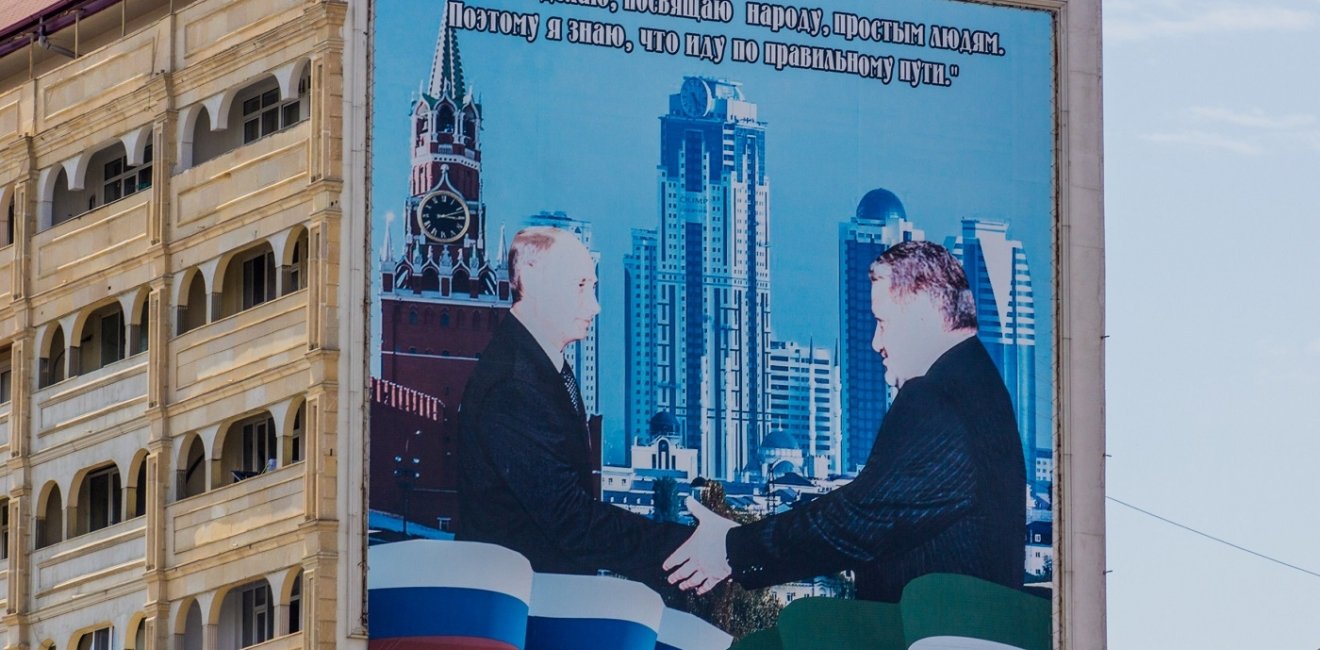
A blog of the Kennan Institute
BY ZARINA SAUTIEVA
The North Caucasus has had to pay with three generations of young Muslims for the people’s disloyalty to Moscow. Now the sons, nephews, and brothers of those who perished in the mountain forests and Syrian deserts are dying on the steppes and in the cities of Ukraine. They are dying for Putin’s regime, which has been killing and imprisoning their family members and fellow Muslims for decades.
In the Caucasus, communities always try to bury their dead at home. Bodies are brought from all over the world and are buried at a local cemetery, those most recently killed laid to rest next to their grandfathers and great-grandfathers. From different wars, where they died fighting for opposing interests, fathers, sons, and brothers are brought to the same burial grounds.
The Chechen strongman Ramzan Kadyrov maintains a high-profile presence in the Russian invasion of Ukraine. Officials from Dagestan and Ingushetia publicly support Putin’s military operation, while soldiers from the North Caucasian republics are disproportionately well represented among the living and the dead combatants. Does that mean that these societies support the war unleashed by the Russian Federation?
No, it does not. Over many years of repression, the people of the Caucasus—particularly those who live in Ingushetia, Dagestan, and Chechnya—have learned to separate private and public spheres. You can be open and sincere in private, but you have to be visibly loyal to the authorities in public.
A Bribe for a Ticket to Hell
In the North Caucasus, military service is a vehicle for upward social mobility. A young man who has served in the army can get a job with the police force or the National Guard (Rosgvardiya). Even the armed underground movement of the Caucasian Emirate preferred to recruit Muslims who had undergone military training. Each conscription campaign would normally be fully booked because authorities deliberately limit the number of available places. Therefore, young people from the North Caucasus bribe their local military commissioners or move to other regions to be drafted. Positions with the police, Rosgvardiya, or regional military units of the Russian army have been routinely purchased for $5,000 to $10,000.
In Chechnya, service with the units of the Rosgvardiya—controlled by Ramzan Kadyrov—in recent years has become one of the last remaining opportunities to provide relative security and livelihood for one’s family.
From the early 2000s to the first half of the 2010s, a popular trend among young men was to join armed underground groups and take courses at the international Islamic universities of Syria, Saudi Arabia, Egypt, or Jordan. For tens of thousands of young people from the North Caucasus, that meant death, imprisonment, or emigration. After the destruction of ISIL, combat sports became popular in the region. MMA champion Khabib Nurmagomedov brought worldwide fame to the regional school of freestyle wrestling. Following their role models, the majority of young Muslims considered it mainstream to show loyalty to the Spiritual Administration of the Muslims of the Russian Federation and to the authorities. Not all of the tens of thousands of Caucasians who participated in wrestling matches achieved great success. Most of them went on to serve as conscripts or soldiers under contract. In February, March, and April 2022, this forced loyalty to the regime, which helped create opportunity for socioeconomic upward mobility, became a death trap that provided a ticket to Russia’s war against Ukraine.
Funerals: A Silent Protest
It is a custom in the North Caucasus for large numbers of relatives, friends, and neighbors to attend funerals. Along with weddings, funerals serve as a traditional public forum, replacing meetings, rallies, and the media. Furthermore, the funeral rite commands solidarity and respect toward the deceased and his family. Currently, however, when those who die in Ukraine are buried in Ingushetia, one may hear whispers that only custom compels one to come and pray for a soldier who died in this unjust war. People speak up in private social media exchanges and in closed chatrooms. There they may say “It is forbidden to pray for those killed in the forbidden war” or even “We do not feel any pity, let anyone who went there voluntarily not return home alive.”
In Chechnya, where more soldiers have died, relatives know that their family members lie in morgues in Belarus, Crimea, or Rostov-on-Don, and that the authorities arrange for the bodies to be repatriated in small groups in order to hide the scale of the massacre. Kadyrov’s followers forbid passing along information about the war to the families of those soldiers from the Chechen Republic. Everyone understands what is going on, but there is no official information.
In early April, another group of bodies was returned to Chechnya for burial, and during one of the funeral processions, some women began to scream and cry: “Why are our children dying there?” They were quickly approached by Kadyrovites and silenced.
Now in Chechnya, “special people” attend the funerals of all those who died in Ukraine, sit in the circle with the other men and women, and listen to what they say. Everybody knows who these people are and exchange glances and nods of understanding. People remain quiet.
Not Our War?
What people in the Caucasus truly think about the war can be discovered through conversations at home, by observing relatives and neighbors at funerals, and by accessing Telegram channels and viewing YouTube videos posted by emigrants.
Here the range of opinions varies, from the view that “this is not our war,” expressed by some religious and community leaders, to calls for taking up arms in the war. On the Ukrainian side.
Disappointment and discontent are growing. Three regions—Chechnya, Ingushetia, and Dagestan—have suffered the most in all the post-Soviet conflicts. Unlike in the western parts of the North Caucasus, there is practically no ethnic Russian population in these regions. A vast majority of residents are practicing Muslims. State-sponsored terror over the years has steamrollered activists and religious dissidents through extrajudicial killings, endless counterterrorism operations, the illegal persecution of “improper” Muslims, and mass detentions of those who go to the mosque.
This is also why people have never forgotten the Caucasian War, imperial Russia’s war, which continued for the better part of the nineteenth century and resulted in annexation of parts of the North Caucasus. Portraits of Imam Shamil (1797–1871), a leader of the Caucasian resistance to the Russian Empire, can be found in every Dagestani home.
The war crimes of the Russian army in Ukraine are reminiscent of the events of that distant bloody war, when soldiers of the empire burned entire villages, and of the past two Chechen wars. Mariupol resembles Grozny, which was bombed by aircraft, resulting in the deaths of tens of thousands of civilians. Bucha’s fate is comparable to that of the villages of Samashki and Novye Aldi, where Russian soldiers killed hundreds of civilians and no one was ever punished for it. In Dagestan, excerpts of Leo Tolstoy’s Hadji Murat have seen a rise in popularity. Bearing on the theme of resistance, this historical novella, set in the Caucasus Mountains in the mid-nineteenth century, depicts the destruction of villages by Russians and ruined mosques and wells—just as in Bucha.
Silent resistance is brewing. Some in the region say that Ukrainians will remember those who did not come to fight with them.
While regional leaders like Kadyrov compete with each other in displays of loyalty to the Moscow regime, the peoples of the North Caucasus are waiting intently for a possible collapse of this very regime.
Representatives of these ethnic groups and religious communities discuss what to do and how to live after the collapse of the empire, as anticipated as it is frightening. People foresee potential conflicts, calculate their own resources and the resources of their opponents. Local police officers in Ingushetia and Chechnya are taking stock of registered weapons and the cars owned by each family. Everyone is preparing for the events to come.
The opinions expressed in this article are those solely of the authors and do not reflect the views of the Kennan Institute.
Author

Democracy Fellow, Center for European Policy Analysis

Kennan Institute
After more than 50 years as a vital part of the Wilson Center legacy, the Kennan Institute has become an independent think tank. You can find the current website for the Kennan Institute at kennaninstitute.org. Please look for future announcements about partnership activities between the Wilson Center and the Kennan Institute at Wilson Center Press Room. The Wilson Center is proud of its historic connection to the Kennan Institute and looks forward to supporting its activities as an independent center of knowledge. The Kennan Institute is committed to improving American understanding of Russia, Ukraine, Central Asia, the South Caucasus, and the surrounding region through research and exchange. Read more

Explore More in The Russia File
Browse The Russia File
Chechnya as a Model of Modern Russia

Russia’s Indigenous Communities and the War in Ukraine

Gas and Power in a Changing US–Russia Relationship

